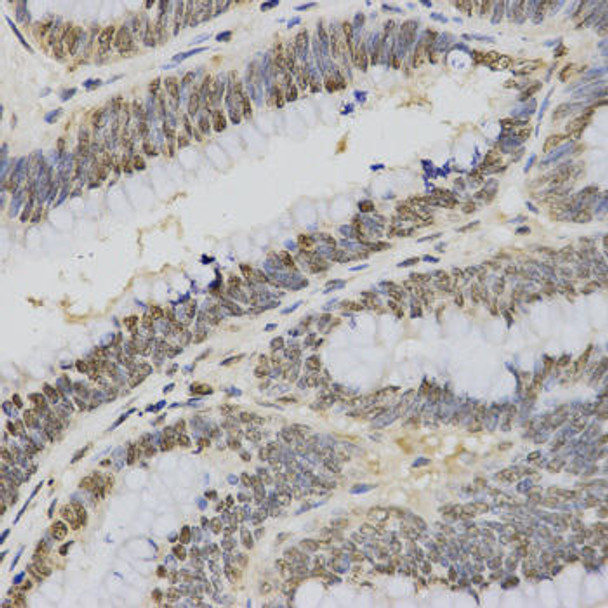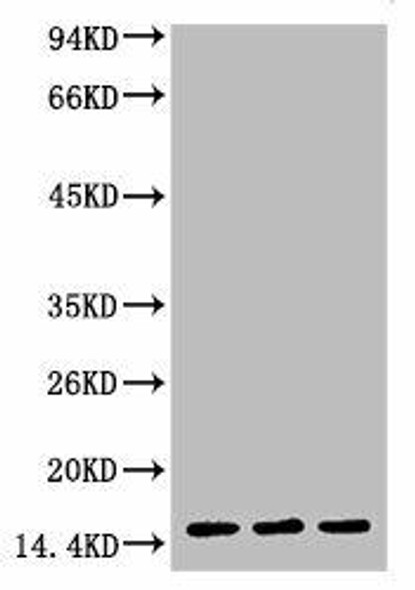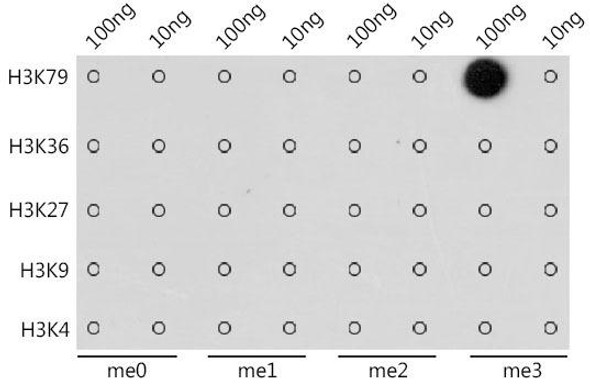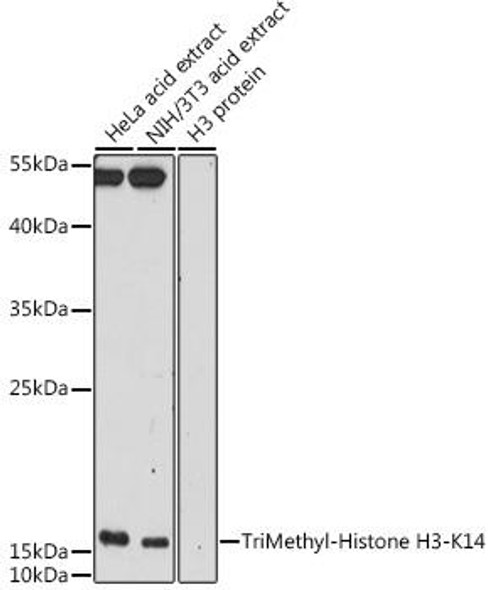Anti-TriMethyl-Histone H3-K4 Antibody (CAB2357)
- SKU:
- CAB2357
- Product Type:
- Antibody
- Applications:
- WB
- IHC
- IF
- IP
- ChIP
- Modification Type:
- Methylation
- Reactivity:
- Human
- Mouse
- Rat
- Host Species:
- Rabbit
- Isotype:
- IgG
- Research Area:
- Epigenetics and Nuclear Signaling
Description
Anti-TriMethyl-Histone H3-K4 Antibody (CAB2357)
The Trimethyl-Histone H3 (K4) Polyclonal Antibody (CAB2357) is a valuable tool for researchers studying epigenetic modifications associated with gene regulation. This antibody, raised in rabbits, specifically targets the trimethylated lysine 4 residue on histone H3, a modification linked to gene activation and transcriptional regulation.Histone methylation at lysine 4 on histone H3 is an important epigenetic mark that plays a role in regulating gene expression and chromatin structure. The CAB2357 antibody is highly reactive with human samples and has been validated for use in techniques such as immunohistochemistry and chromatin immunoprecipitation assays.By targeting the trimethylated form of histone H3 at lysine 4, researchers can investigate the impact of this specific epigenetic modification on gene expression patterns, cellular differentiation, and development.
This antibody is a valuable tool for studies in various fields, including cancer research, developmental biology, and stem cell research.Understanding the role of trimethylated histone H3 (K4) in gene regulation can provide valuable insights into disease mechanisms and potential therapeutic targets for a range of conditions. The CAB2357 antibody enables researchers to explore the complex interplay between epigenetic modifications and cellular processes, advancing our understanding of gene regulation and disease pathways.
| Antibody Name: | Anti-TriMethyl-Histone H3-K4 Antibody |
| Antibody SKU: | CAB2357 |
| Antibody Size: | 20uL, 50uL, 100uL |
| Application: | WB IHC IF IP ChIP ChIPseq |
| Reactivity: | Human, Mouse, Rat, Other (Wide Range) |
| Host Species: | Rabbit |
| Immunogen: | A synthetic methylated peptide corresponding to residues surrounding K4 of human histone H3 |
| Application: | WB IHC IF IP ChIP ChIPseq |
| Recommended Dilution: | WB 1:500 - 1:2000 IHC 1:50 - 1:200 IF 1:50 - 1:200 IP 1:50 - 1:200 ChIP 1:20 - 1:100 ChIPseq 1:20 - 1:100 |
| Reactivity: | Human, Mouse, Rat, Other (Wide Range) |
| Positive Samples: | HeLa, C2C12, C6 |
| Immunogen: | A synthetic methylated peptide corresponding to residues surrounding K4 of human histone H3 |
| Purification Method: | Affinity purification |
| Storage Buffer: | Store at -20'C. Avoid freeze / thaw cycles. Buffer: PBS with 0.02% sodium azide, 50% glycerol, pH7.3. |
| Isotype: | IgG |
| Sequence: | Email for sequence |
| Gene ID: | 8290 |
| Uniprot: | Q16695 |
| Cellular Location: | Chromosome, Nucleus |
| Calculated MW: | 15kDa |
| Observed MW: | 17kDa |
| Synonyms: | H3.4, H3/g, H3FT, H3t, HIST3H3, Histone H3, HIST1H3A |
| Background: | Histones are basic nuclear proteins that are responsible for the nucleosome structure of the chromosomal fiber in eukaryotes. Nucleosomes consist of approximately 146 bp of DNA wrapped around a histone octamer composed of pairs of each of the four core histones (H2A, H2B, H3, and H4). The chromatin fiber is further compacted through the interaction of a linker histone, H1, with the DNA between the nucleosomes to form higher order chromatin structures. This gene is intronless and encodes a replication-dependent histone that is a member of the histone H3 family. Transcripts from this gene lack polyA tails; instead, they contain a palindromic termination element. This gene is located separately from the other H3 genes that are in the histone gene cluster on chromosome 6p22-p21.3. |
| UniProt Protein Function: | HIST3H3: Core component of nucleosome. Nucleosomes wrap and compact DNA into chromatin, limiting DNA accessibility to the cellular machineries which require DNA as a template. Histones thereby play a central role in transcription regulation, DNA repair, DNA replication and chromosomal stability. DNA accessibility is regulated via a complex set of post-translational modifications of histones, also called histone code, and nucleosome remodeling. The nucleosome is a histone octamer containing two molecules each of H2A, H2B, H3 and H4 assembled in one H3-H4 heterotetramer and two H2A-H2B heterodimers. The octamer wraps approximately 147 bp of DNA. Expressed in testicular cells. Belongs to the histone H3 family. |
| UniProt Protein Details: | Protein type:DNA-binding Chromosomal Location of Human Ortholog: 1q42 Cellular Component: nucleoplasm; nucleus Molecular Function:protein binding; DNA binding; histone binding; protein heterodimerization activity Biological Process: nucleosome assembly; negative regulation of protein oligomerization; protein heterotetramerization; telomere maintenance |
| NCBI Summary: | Histones are basic nuclear proteins that are responsible for the nucleosome structure of the chromosomal fiber in eukaryotes. Nucleosomes consist of approximately 146 bp of DNA wrapped around a histone octamer composed of pairs of each of the four core histones (H2A, H2B, H3, and H4). The chromatin fiber is further compacted through the interaction of a linker histone, H1, with the DNA between the nucleosomes to form higher order chromatin structures. This gene is intronless and encodes a member of the histone H3 family. Transcripts from this gene lack polyA tails; instead, they contain a palindromic termination element. This gene is located separately from the other H3 genes that are in the histone gene cluster on chromosome 6p22-p21.3. [provided by RefSeq, Jul 2008] |
| UniProt Code: | Q16695 |
| NCBI GenInfo Identifier: | 18202512 |
| NCBI Gene ID: | 8290 |
| NCBI Accession: | Q16695.3 |
| UniProt Secondary Accession: | Q16695,Q6FGU4, B2R5K3, |
| UniProt Related Accession: | Q16695 |
| Molecular Weight: | |
| NCBI Full Name: | Histone H3.1t |
| NCBI Synonym Full Names: | histone cluster 3, H3 |
| NCBI Official Symbol: | HIST3H3 |
| NCBI Official Synonym Symbols: | H3t; H3.4; H3/g; H3FT |
| NCBI Protein Information: | histone H3.1t; H3/t; histone 3, H3; H3 histone family, member T |
| UniProt Protein Name: | Histone H3.1t |
| UniProt Synonym Protein Names: | H3/g |
| UniProt Gene Name: | HIST3H3 |
| UniProt Entry Name: | H31T_HUMAN |
 | Western blot analysis of extracts of various cell lines, using TriMethyl-Histone H3-K4 antibody at 1:500 dilution. Secondary antibody: HRP Goat Anti-Rabbit IgG (H+L) at 1:10000 dilution. Lysates/proteins: 25ug per lane. Blocking buffer: 3% nonfat dry milk in TBST. Detection: ECL Basic Kit. Exposure time: 30s. |
 | Dot-blot analysis of all sorts of methylation peptides using TriMethyl-Histone H3-K4 antibody at 1:1000 dilution. |
 | Immunohistochemistry of paraffin-embedded human breast cancer using TriMethyl-Histone H3-K4 Rabbit pAb at dilution of 1:25 (40x lens). Perform high pressure antigen retrieval with 10 mM citrate buffer pH 6. 0 before commencing with IHC staining protocol. |
 | Immunohistochemistry of paraffin-embedded human colon carcinoma using TriMethyl-Histone H3-K4 Rabbit pAb at dilution of 1:25 (40x lens). Perform high pressure antigen retrieval with 10 mM citrate buffer pH 6. 0 before commencing with IHC staining protocol. |
 | Immunofluorescence analysis of 293T cells using TriMethyl-Histone H3-K4 antibody (A2357). Blue: DAPI for nuclear staining. |
 | Chromatin immunoprecipitation analysis of extracts of HeLa cells, using TriMethyl-Histone H3-K4 Rabbit pAb antibody and rabbit IgG. The amount of immunoprecipitated DNA was checked by quantitative PCR. Histogram was constructed by the ratios of the immunoprecipitated DNA to the input. |





















